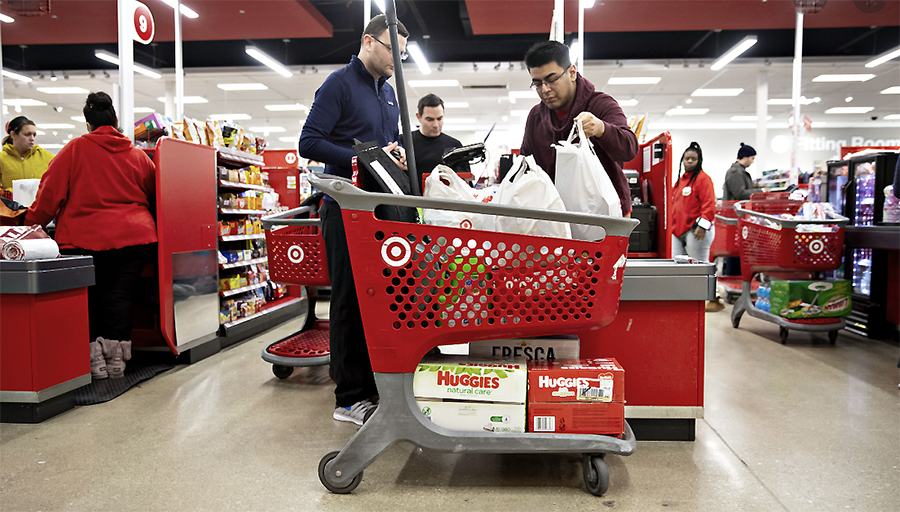Target Corp. said that as the COVID-19 crisis has evolved, the company has been experiencing unusually strong traffic and sales, particularly in its stores and same-day services, as guests rely on Target for essential items like food, medicine, cleaning products, and pantry stock-up items. As a result, the company has adjusted the expected timing of some of its strategic initiatives to support the team and minimize potential disruptions in their work to serve the needs of U.S. consumers.
Updated plans for Target’s remodel program anticipate approximately 130 remodels in 2020, down from the previous expectation of approximately 300. This will allow remodeling projects already underway to be completed and to move all other remodeling projects into 2021. Similarly, the company now expects to open 15-to-20 new small-format stores in 2020 rather than the 36 previously announced. This will also allow projects already underway to be completed but move the remaining new store projects into next year. In addition, the effort to incorporate fresh grocery and adult beverages into the company’s Drive Up and Order Pickup services are temporarily on hold.
“We are prioritizing the work that’s in front of us to support our team, store operations and supply chain as families across the country rely on Target for everything they need in this challenging environment. I want to thank our entire team for their efforts which have been nothing short of heroic,” said Brian Cornell, chairman and CEO, Target. “Over the past few weeks, we’ve experienced an unprecedented surge in traffic and sales as guests rely on our stores and same-day services. Ensuring we can take care of our team and deliver for the millions of guests who are counting on us remains our top priority.”
Also announced last week, Target has raised its industry-leading pay by $2 an hour for its store and distribution center hourly full-time and part-time workers until at least May 2. In addition, the company is offering a new option for employees who are 65 or older, pregnant or those with underlying medical conditions, to access paid leave. Target’s latest investments include bonuses it is paying to frontline employees including, for the first time, bonuses for 20,000 hourly store team leaders who manage individual departments in its stores across the country.
The retailer will continue to closely monitor the situation in the coming weeks and months and will revisit the timing of its strategic initiatives after shopping returns to a more predictable pattern. More information on how Target is supporting its customers and employees in response to COVID-19 can be found on Target.com/abullseyeview.
Update on Financial Performance
Target also provided an update on trends in the company’s sales performance as well as the expected impacts of investments in employee pay and benefits and changes to in-store processes.
For the first three weeks of the first quarter, which began on February 2, total company comparable sales and category mix were in line with expectations and prior financial guidance.
Beginning with the fourth week of February and into the first part of March, the retailer saw an increase in traffic and comparable sales across its multi-category portfolio. For the month of February, total company comparable sales increased 3.8 percent.
Beginning in mid-March, the company experienced an even stronger surge in traffic and sales with category mix heavily concentrated in the Essentials and Food & Beverage categories. Around that time, strength also emerged within portions of Hardlines that support in-home activities including Home Office and Entertainment, while performance softened in Apparel & Accessories.
Month-to-date in March, overall comparable sales are more than 20 percent above last year with comparable sales in Essentials and Food & Beverage up more than 50 percent. During that same period, comparable sales in Apparel & Accessories were down more than 20 percent compared with last year.
While Target has maintained its low prices during this period, stronger-than-anticipated quarter-to-date sales have led to gross margin dollar growth ahead of prior expectations. However, continued sales declines in higher-margin discretionary categories could result in lower-than-expected gross margin dollar performance for the remainder of the quarter.
In addition, certain first-quarter costs are anticipated to be higher than prior expectations driven by investments in pay and benefits, the spike in merchandise volume in stores and supply chain and the impact of additional hours dedicated to more rigorous cleaning routines in stores and distribution centers across the U.S. Collectively, these changes are expected to add more than $300 million of incremental costs to the company’s prior outlook for the first quarter.
Given the highly fluid and uncertain outlook for consumer shopping patterns and government policy related to COVID-19, there is an unusually wide range of potential outcomes for Target’s first-quarter financial performance. As a result, the company withdrew its prior guidance for the first-quarter and full-year 2020 sales, operating income and earnings per share. In addition, while Target will continue to invest in its business and employees, the company is suspending share repurchase activity in the current environment.
“During these unprecedented times, the benefits of our strong balance sheet and diverse, multi-category assortment are particularly important,” said Michael Fiddelke, executive vice president and chief financial officer. “With the best team in retail focused on serving our guests and ample financial capacity to navigate a highly uncertain outlook, we are confident that Target will emerge from the current environment with an even stronger guest relationship and continue to operate from a position of financial strength.”
Photo courtesy Target














